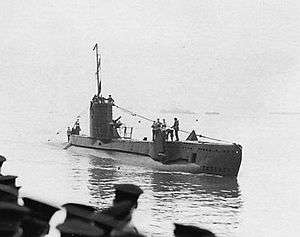HMS Umbra
 HMS Umbra | |
| History | |
|---|---|
| Name: | HMS Umbra |
| Builder: | Vickers Armstrong, Barrow-in-Furness |
| Laid down: | 19 July 1940 |
| Launched: | 15 March 1941 |
| Commissioned: | 2 September 1941 |
| Fate: | Sold for scrap on 9 July 1946, broken up at Blyth |
| General characteristics | |
| Class and type: | U-class submarine |
| Displacement: |
|
| Length: | 58.22 m (191 feet) |
| Beam: | 4.90 m (16 ft 1 in) |
| Draught: | 4.62 m (15 ft 2 in) |
| Propulsion: |
|
| Speed: |
|
| Complement: | 27-31 |
| Armament: |
|
HMS Umbra (P35) was a Royal Navy U-class submarine built by Vickers-Armstrong at Barrow-in-Furness. So far she has been the only ship of the Royal Navy to bear the name Umbra.
Career
-1-.jpg)
She spent most of the war in the Mediterranean, where she sank the Italian merchants Assunta De Gregori, Francesco Barbaro, Sacro Cuore, Emilio Morandi, the Italian transport ship Manfredo Campiero, and the German merchant Süllberg. She also sank the Italian salvage vessel Rampino, and picked up her sole survivor, and torpedoed and sank the damaged Italian heavy cruiser Trento on 15 June 1942. Trento had already damaged by a torpedo from a British Beaufort aircraft (No. 217 Squadron RAF based at Malta). She also attacked the Italian battleship Littorio, but her torpedoes missed their target.
Umbra also torpedoed and destroyed the grounded German supply ship Amsterdam on 23 October 1942, and sank the Italian tug Pronta that was trying to salvage the Amsterdam. The Amsterdam had been grounded after being hit by a torpedo during an air attack. Umbra also damaged the Italian troop transport Piemonte (ex-Canadian Pacific Railways passenger liner Minnedosa, Harland and Wolff hull number 464) and the Italian merchant Napoli. The ship was beached and later destroyed by aircraft. She later attacked and damaged the German troop transport Macedonia north of Sousse, Tunisia. The damaged German ship was beached and abandoned. She also launched an attack on the Italian merchant Nino Bixio, but missed her.
One of her last actions was to attack the Italian sailing vessels Nuovo Domenico and Concetta Falco with gunfire in the Gulf of Hammamet on 11 January 1943. The Nuovo Domenico was damaged during the attack.
She survived the war and was sold to be broken up for scrap on 9 July 1946, and scrapped at Blyth.
References
- "HMS Umbra (P 35)". uboat.net. Retrieved 2007-02-25.
- Colledge, J. J.; Warlow, Ben (2006) [1969]. Ships of the Royal Navy: The Complete Record of all Fighting Ships of the Royal Navy (Rev. ed.). London: Chatham Publishing. ISBN 978-1-86176-281-8. OCLC 67375475.
- Hutchinson, Robert (2001). Jane's Submarines: War Beneath the Waves from 1776 to the Present Day. London: HarperCollins. ISBN 978-0-00-710558-8. OCLC 53783010.